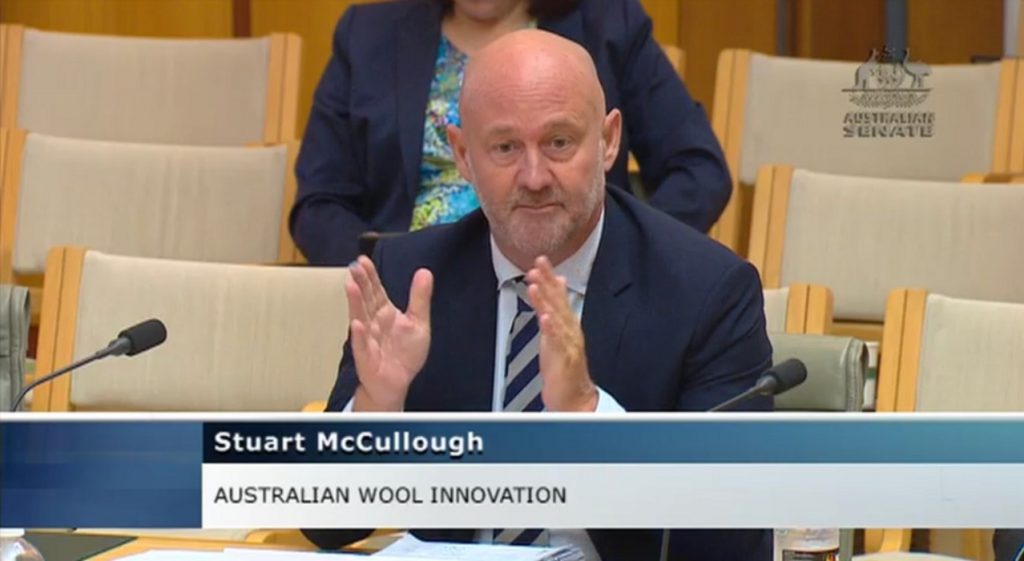
AWI CEO Stuart McCullough at the Senate Estimates hearing.
AUSTRALIA’S dependence on China’s demand for its wool and proposed European Union labelling laws were threats to the industry, a Senate Estimates committee was told yesterday.
Australian Wool innovation chief executive officer Stuart McCullough made the comment in his industry update to the Rural, Regional Affairs and Transport Legislation Committee.
Mr McCullough also told the senators that AWI’s revenue had dropped dramatically as wool production and prices fell, with 2021-22 revenue expected to be $53 million.
But he said wool production was forecast to increase to 305 million kilograms next year and wool prices had recovered to a benchmark of around 1300c/kg clean.
“There are a couple of threats in the markets.
“Of course, our dependence on China is a threat,” Mr McCullough said.
“As I said before 90 percent of the buying power is going into that market.”
Mr McCullough said AWI’s Emerging Markets Strategy was highlighted at the last Senate Estimates hearing and the levy-funded body had been pursuing emerging markets for the last 10 years.
“The bottomline is there is no other China.
“China has the perfect climate, perfect population and the perfect affluence to consumer our product,” he said.
He said processing has grown in China over the last 50 years, “not the last five.”
Mr McCullough said there are some promising markets, like Vietnam, where AWI had been working in for nearly 10 years.
“The other threat that I will highlight are the EU labelling laws.
“At the moment they are moving down the path of branding polyesters, man-made petroleum and man-made cellulosic fibres with a better rating than natural fibres,” he said.
“And it is something we are very conscious of and are working very hard to demonstrate t5hat that’s not the case.
“That happens by way of a couple of things – they don’t take into account the mining of the materials for man-made petroleum based (fibres) and they don’t take into account micro-plastics, and they don’t take into account biodegradability after the garment has been disposed of,” Mr McCullough said.
“So that’s a real concern for us and something we are fighting very hard to address and make right.”
AWI revenue and staff numbers have dropped
Mr McCullough said revenue at the company has dropped dramatically.
“In 2018-19 we had $100 million in revenue, in 2021-22 we’re forecasting for $53 million in revenue
“So it’s basically halved (to) the company, which is a function of the levy being reduced which is a function of the volume coming down and a function of the price coming down as well.”
Mr McCullough said AWI staff numbers from that same period have gone from 200 to about 139 at the moment.
“All leases of all our offices around the world are being renegotiated or sub-let completely, including Sydney right now.”
Mr McCullough said AWI’s marketing activities were dramatically reduced in the middle of COVID “simply because they weren’t going to yield.”
“There is no point deploying marketing dollars in a market where you can’t go and buy a garment because the store is not open.”
“So we’ve reduced our marketing budget dramatically over the last 12 months,” he said.
Markets and seasonal conditions improving
Mr McCullough said markets are starting to emerge.
AWI is “quite confident” about the United States and United Kingdom markets because of their vaccination regimens.
Mr McCullough said AWI post-farm and on-farm research has continued largely unhindered.
“The big projects in the on-farm research area are the Merino Lifetime Productivity Project.
“There is a promising flystrike vaccine that we are working on with CSIRO in Melbourne with University of Melbourne, which is showing real promise,” he said.
Mr McCullough said seasonal conditions have improved across Australia, and although wool production had fallen as low as 285,000 million kgs, it was forecast reach 305mkgs next year.
He said wool prices got as low as 850c/kg clean during the start of the COVID pandemic, but are back at 1300c/kg now.
“They seem to want to bounce in that $13 space well supported by China buying activity, which is about 90 percent of the Australian wool clip, right now.”
More on China…..
At a FutureWool presentation at Dunkeld this month, AWI’s general manager, wool grower engagement, Marius Cuming said it was scary that Australia’s industry was so reliant on China. He said about 90 percent of the nation’s wool goes to China for processing.
But he said although beef, barley, wine, cotton, alcohol, lobsters and sugar have been hit with tariffs into China, whereas average annual exports of wool to China valued at about US$2.5 billion and iron ore imports have not been hit.
“They rely on us for their wool textile industry just as they rely on Australian iron ore for their steel industry.”
Mr Cuming said although 90pc of Australia’s wool heads to China, half of which is consumed in-country, the country relied on wool to generate export income.
“Whereas barley, beef, cotton and alcohol – they don’t clip the ticket – they don’t add value to those products, they just sell them.”
Mr Cuming said China manufactured Australia’s wool and required our wool, particularly our fine apparel wool, for their textile mills, their employment and their exports.
“We’ve been dealing with China for over half a century now, the two industries are very tightly connected, diplomatically things are extremely tense, but in terms of industry-to-industry, things are very strong.”

With AWI’s “China China China” mantra and now its pro-mulesing leadership, growers are now reaping what AWI sows — market concentration with 90 percent of our wool going to one market. Hopeless leadership.
With this sort of performance from AWI many growers would be delighted to see AWI’s income reduced to zero. We could then have a complete clean out of dead wood and create a new peak R&D organization worthy of our industry, free of statutory taxes, humbug and politics.